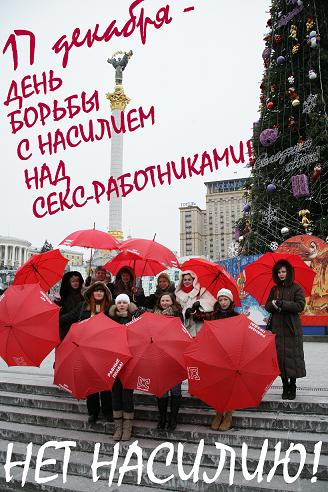 Recently I published a gallery of pictures of the sex industry. Now another gallery of pictures is on the website now, depicting activism by self-identified sex workers and prostitutes. The photos show public actions projecting a message about rights, about laws, about having a voice. Many of the photos show groups of sex workers with their allies marching in public spaces on designated days or at larger events. There are other less visible activities that are, of course, forms of advocacy, but photos of ordinary people sitting at meetings or writing or working on computers are not so interesting to look at. Sex worker performances at shows and conferences often have activist intentions and some of those are here, but the collection would get unwieldy if I tried to put all of them in.
Recently I published a gallery of pictures of the sex industry. Now another gallery of pictures is on the website now, depicting activism by self-identified sex workers and prostitutes. The photos show public actions projecting a message about rights, about laws, about having a voice. Many of the photos show groups of sex workers with their allies marching in public spaces on designated days or at larger events. There are other less visible activities that are, of course, forms of advocacy, but photos of ordinary people sitting at meetings or writing or working on computers are not so interesting to look at. Sex worker performances at shows and conferences often have activist intentions and some of those are here, but the collection would get unwieldy if I tried to put all of them in.
You will see a lot of red umbrellas in photos after 2005. This symbol was chosen on the occasion of a big conference held in Brussels in October 2005 (I was one of the organisers). We were going to march through the city for a long time and it was possible it would rain, and we wanted to have something to unify us visually. Umbrellas seemed obvious and someone suggested red ones. There was no grand plan to spread the symbol internationally, nor did we think the umbrella itself meant anything. It turns out it had been used in Venice in 2001, but I don’t remember hearing about that in 2005, though maybe it was in the back of someone’s mind. History is a moving target.
The way it has been picked up as a symbol is suggestive: you don’t see it used in Latin America or India where the movement was well-established long before 2005, but the USA, a big country with many small groups,and regions with little activist tradition, like eastern Africa and eastern Europe and China, picked it up quickly – I suppose it is strengthening to have a symbol showing their struggle is international. Even where the umbrella isn’t used, the colour red tends to be – though not always. I wrote an abbreviated history of the movement in Spanish some years ago, and more recently a Swedish version was translated to English as Note to anti-prostitutionists: Sex worker movements are nothing to sneer at.
Despite goals that may differ greatly according to local politics, and internal political conflicts, all activists unite around fundamental principles. Words and phrases repeatedly seen in placards and signs include:
- Rights (Droits, Derechos)
- Respect
- Access / HIV / AIDS
- Decriminalize
- Human rights
- Whores (Putas, Putes)
- Violence
- Prostitution
- Sex workers (Trabajadoras del sexo/sexuales, Travailleuses du sexe)
These pictures have been collected randomly. I make no encyclopedic claims, and some countries get more coverage than others (though consider, before objecting to how many India has, how big the total population of sex workers is liable to be). The whole collection is here – comments can be made individually on each photo. Contact me with any problems. The photo at the top is from Ukraine.
–Laura Agustín, the Naked Anthropologist


I am in this picture! Sex workers from the Ukraine need to respect human rights!